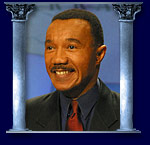Kweisi Mfume, whose West African name means, "conquering son of kings," was born, raised and educated in Baltimore, and it was there that he followed his dreams to impact society and shape a more humane public policy. Mfume became politically active as a freshman in college, as editor of the school's newspaper and as head of the Black Student Union. He graduated magna cum laude from Morgan State University, and later returned there as an adjunct professor, teaching courses in political science and communications. In 1984, he earned a Masters degree in liberal arts, with a concentration in International Studies, from John Hopkins University.
As Mfume's community involvement grew, so did his popularity as an activist, organizer, and radio commentator. He translated that approval into a grassroots election victory when he won a seat on the Baltimore City Council in 1979 by a margin of just three votes. During his seven years of service in local government, Kweisi Mfume led the efforts to diversify city government, improve community safety, enhance minority business development and divest city funds from the apartheid government of South Africa. Later, in 1986, he was decisively elected to the Congressional seat that he was to hold for the next decade.
As a member of Congress, Mfume was active with broad committee obligations. He served on the Banking and Financial Services Committee, and held the ranking seat on the General Oversight and Investigations Subcommittee. He also served as a member of the Committee on Education and as a senior member of the Small Business Committee.
While in his third term, the Speaker of the House chose him to serve on the Ethics Committee and the Joint Economic Committee of the House and Senate, where he later became chair.
As a member of the House of Representatives, Congressman Mfume consistently advocated landmark minority business and civil rights legislation. He successfully co-sponsored and helped to pass the Americans with Disabilities Act. He authorized the minority contracting and employment amendments to the Financial Institutions Reform and Recovery Act. He strengthened the Equal Credit Opportunity Law, and amended the Community Reinvestment Act in the interest of minority financial institutions. He co-authored and successfully amended the Civil Rights Bill of 1991 to apply the act to U.S. citizens working for American-based companies abroad. He also sponsored legislative initiatives banning assault weapons and establishing stalking as a federal crime.
Mfume has served as chairman of the Congressional Black Caucus, and later as the Caucus' Chair of the Task Force on Affirmative Action. During his last term in Congress, he was appointed by the House Democratic Caucus as the Vice-Chairman for Communications.
Mfume became President and Chief Executive Officer of the National Association for the Advancement of Colored People (NAACP) on February 20, 1996, after being unanimously elected to the post by the NAACP's Board of Directors. Mr. Mfume gave up his seat in the United States Congress where he had, for ten years, represented Maryland's 7th Congressional District, to assume the NAACP presidency.
Since assuming the position of President and CEO of the nation's oldest and largest civil rights organization, Mfume has raised the standards and expectations of NAACP branches nationwide, and has worked with the NAACP volunteers across the country to help usher in a whole new generation of civil rights advocacy.
His six-point action agenda, which encompasses Civil Rights, Political Empowerment, Educational Excellence, Economic Development, Health and Youth Outreach, has given the NAACP a clear and compelling blueprint for the 21st century.
Mfume was formerly a member of the Board of Visitors of the U.S. Naval Academy in Annapolis, the Advisory Board of the Schomburg Commission for the Preservation of Black Culture, and the Senior Advisory Committee of the Harvard University John F. Kennedy School of Government. He is presently a member of the Gamma Boule Sigma Pi Phi Fraternity, Most Worshipful Prince Hall Masons and Big Brothers and Big Sisters. He also serves on the Johns Hopkins University Board of Trustees, the Morgan State University Board of Regents, the Meyerhoff National Advisory Board of the University of Maryland, and People for the American Way.
Mfume's background in broadcasting includes thirteen years in radio. For nine years he hosted the award-winning television show The Bottom Line. He is the recipient of eight honorary doctorate degrees and hundreds of awards, proclamations and citations. His best selling autobiography is entitled No Free Ride. |
